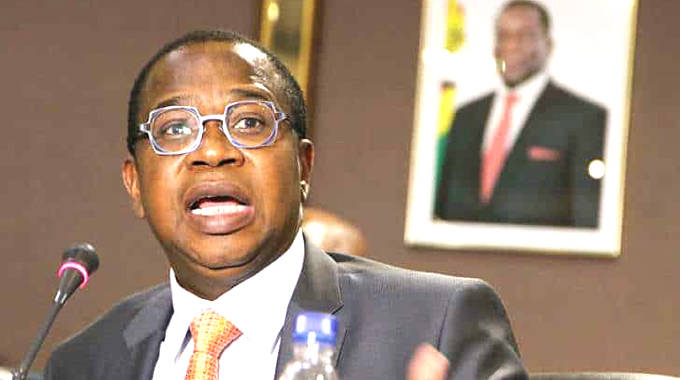Budget to accelerate growth, while keeping gains

Herald Reporters
Zimbabwe’s 2021 National Budget being presented this afternoon is the first of the Second Republic to stress growth, rather than the ground clearance of stabilising and reforming the basics, as Finance and Economic Development Minister Professor Mthuli Ncube incorporates the first year targets of the new National Development Strategy 1 (NDS1) into the detailed Government revenue and spending plans.
Although the last two Budgets were guided by the Transitional Stabilisation Programme (TSP) there were still development items in those budgets, which is why we now have more dams and better roads and quite a bit of money spent on farmers with the development component increasing between the first and second budgets.
The policies and programmes put in place by the Second Republic are bearing fruits as evidenced by the massive infrastructure development targeting roads, energy, dams among others, and such efforts, along with the stabilisation programmes, have helped to turn around the fortunes of the country’s economy.
We should expect an accelerated growth in the development components, while still keeping the gains.
President Mnangagwa has highlighted the progress achieved and the acceleration we can expect.
“I recently had the privilege to commission the completed Marovanyati Dam in Buhera District, Manicaland Province which will go a long way to ensure food and nutrition security. Under the 2021 National Budget which will be announced tomorrow (today) more dams such as Causeway, Chivhu, Gwai-Shangani, Silverstream among others will receive resources to enable speedy completion,” said President Mnangagwa in his address to the Politburo yesterday.
And the new Budget is not going to abandon the stability created by TSP. We can expect the minister to continue stressing that we need to keep our foundations firm. But what we can expect is the fleshing out of the Government role in NDS1, and taxation and other measures the Government is making to ensure the private sector can play its major development role.
For a start, the bulk of savings need to be reserved for lending to producers, not consumers.
VIEW FULL BUDGET STATEMENT:
http://www.zimtreasury.gov.zw/index.php?option=com_phocadownload&view=category&id=65&Itemid=790
The National Development Strategy 1 (NDS1) was launched on November 16, and the 2021 National Budget, and how it will be implemented, will be critical to its success.
Professor Ncube has already said “the budget will be anchored on the National Development Strategy (NDS1) and builds on the successes of the TSP”.
Key successes under the TSP have been the eradication of the “twin deficits” — the fiscal and current account deficits, as well as currency stabilisation. That means the Government does not borrow or print money any more to pay monthly bills, and that we export more than we import.
Economists expect Minister Ncube to go beyond current stability and boost productivity with his revenue and spending measures.
Says economic analyst Persistence Gwanyanya: “Owing to austerity measures and efficient operation of the foreign currency auction system, the environment has been fairly stable from June 2020 to date. Now, that we have
got the basics right we need to focus on sustaining that stability and use it as a spring-board for economic growth and development.
“In view of the structural and permanent nature of our challenges, there is need to address real fundamentals relating to mainly production and productivity, consumption, trade and budget balance as well as resultant debt and diminished confidence levels,” said Mr Gwanyanya.
“Importantly, addressing these permanently requires that the Budget focuses on re-industrialisation, which is basically the share of manufacturing sector to gross domestic product (GDP).
“Emphasising measures that promote re-industrialisation is necessary to deal with growth challenges, budget and trade deficits, unemployment and therefore informalisation problems, all of which support poverty reduction imperative.”
The new economic blueprint is targeting an average of 5 percent GDP growth a year for the next 5 years.
Such growth must be underpinned by the success of the agriculture, mining, manufacturing, tourism and service sectors. And the 2021 National Budget should address current impediments to the growth of these sectors and others.
Capacitation of these economic sectors will result in new job creation going forward.
Mr Gwanyanya, however, added that the national financial plan must also address social issues.
In Zimbabwe, as in most countries across the globe, socio-economic challenges have been worsened on account of the Covid-19 pandemic, and there is likelihood that the National Budget will seek to further address these issues.
Already the minister has introduced social payments, and converted subsidies that benefit rich and poor alike to direct payments that benefit the poor.
“Development is all about welfare, the level of happiness and well-being of a nation. Economic growth alone is not enough to guarantee development.
“Without improvement in social delivery, there is no real development to talk about. With a well-balanced budget, a country should devote meaningful amounts of its budget towards social service delivery mainly health, education, water and sewer reticulation, all of which are necessary to improve the quality of life.
“Equally important is the need to create sustainable funding sources for infrastructure development, which is seen as the fulcrum for any growth and development.
But in seeking to satisfy these numerous interests, the fiscal authorities are faced by a delicate balancing act.
Emerging from the austerity-oriented TSP to a growth-focused NDS1, means Government still needs to spend within its means, something that appears to be a mantra with the minister.
The Confederation of Zimbabwe Industries (CZI), with its long institutional memory of boom and bust from the days of fiscal indiscipline, is keen to stress that the gains from TSP need to be kept.
“A consistent money supply target that brings back confidence and supported by high levels of fiscal discipline is adequate for exchange rate stabilization in Zimbabwe,” said the CZI.
“The ballooning or overshooting exchange rate, which is mainly driven by confidence issues and amnesty of the previously suppressed rate embedded in expectation, will subside and stabilise if authorities stick to tight money supply and fiscal discipline.
“For long term planning, central bank independence can help bringing back the lost confidence, hence making money supply targeting a more effective tool for managing both exchange rate and inflation.”
To the extent that money supply and demand are kept in balance, the auction exchange rate will remain stable and become a predictable reference rate for price stability going forward.
And such stability will give a solid base for the effective implementation of the new financial plan and NDS1.









Comments